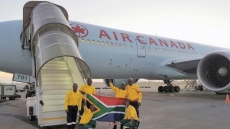Variable speed signs are now active in three locations throughout the province as part of a pilot project to help reduce the frequency and severity of weather-related crashes, announced Minister of Transportation and Infrastructure Todd Stone.
“Starting today, variable speed limit signs will be activated in three locations - the Coquihalla, Sea to Sky and the Trans-Canada Highway near Revelstoke,” said Stone.
“It is important drivers understand that along these corridors, these signs aren’t ‘speed readers’, they are the law. These electronic signs will adjust the speed limit according to conditions and will require drivers to slow down and reduce their speed in bad weather.”
This safety initiative targets critical sections of Highways 1, 5 and 99. Crews have now installed 18 variable speed signs along Highway 1 from Perry River to Revelstoke, 13 variable speed signs along the Coquihalla from Portia Interchange to the former Toll Plaza and 16 variable speed signs along the Sea to Sky from Squamish to Function Junction.
The variable speed limit program is also supported by recent changes in the B.C. Motor Vehicle Act regulations that allow police to enforce these posted speeds. Drivers are encouraged to be aware when they enter a variable speed limit zone that posted limits are the maximum speeds allowed.

The digital signs will be very visible to drivers, and the speed limit will be adjusted to reflect driving conditions. Overhead message signs at the entrance of each corridor will inform drivers to be aware of changing weather conditions. Flashing amber lights will alert drivers to adjusted speeds that are not the posted limits along these corridors.
“Many highways in B.C. pass through different climate zones, and the Sea to Sky Highway is no exception,” said West Vancouver-Sea to Sky MLA Jordan Sturdy.
“Motorists that drive Highway 99 are familiar with rapidly changing weather conditions, where it is not uncommon to experience sunny and dry conditions, as well as rain, sleet or a full-blown snowstorm somewhere along the way. These signs alert drivers to the need to adjust their speed to current conditions.”
“Speeding is the leading cause of fatal car crashes in our province,” said chief constable Neil Dubord, chair of the B.C. Association of Chiefs of Police Traffic Safety Committee. “Seven out of ten speed-related crashes are related to driving too fast for the road conditions. Police across B.C. are urging drivers to be alert, slow down and adjust their driving for the conditions.”

Whether it is extreme cold, freezing rain or heavy snowfall, an extensive system of traffic, pavement and visibility sensors are calibrated to detect the conditions and provide a recommended speed to operations staff located in the Regional Traffic Management Centre in Coquitlam. The recommended speed will be used to update the speed shown on digital signs, to help drivers know a safe driving speed during adverse weather conditions.
The ministry has invested $12.5 million to install and run the pilot systems that were largely made and manufactured in B.C. This pilot program is part of the ministry's $25-million per-year Road Safety Improvement Program, as announced in B.C. on the Move.



